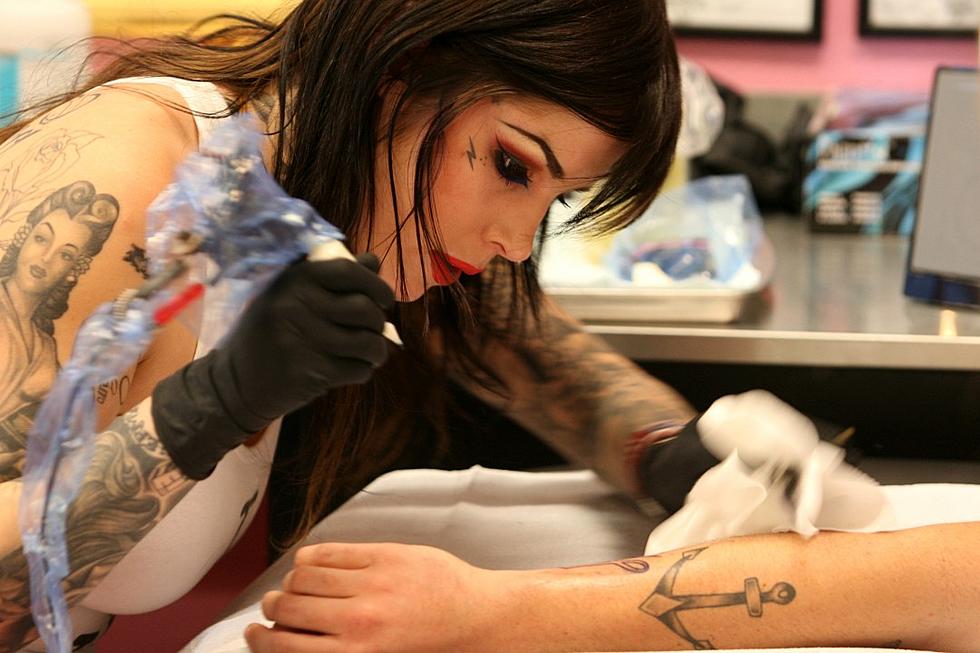
Kat Von D on Trial for Alleged Copyright Infraction of Famous Miles Davis Portrait
A trial concerning an alleged copyright infraction by famous tattoo artist Kat Von D is underway, with the jury having to figure out if Von D violated the fair use doctrine in replicating parts of a famous Miles Davis portrait.
Per Rolling Stone, Von D was present in a Los Angeles courtroom on Tuesday (Jan. 23) where the trial got underway. At the center of the conflict is a 1989 photo taken by photographer Jeffrey Sedlik in which he shot jazz legend Miles Davis staring directly into a camera with his finger held to his lips mimicking a "shh" motion. The photo initially appeared on the cover of JAZZIZ magazine in 1989, and Sedlike registered a trademark on the photo with the U.S. Copyright Office in 1994.
Fast forward to 2017 and Von D posted a photo through her Instagram of her inking the Miles Davis portrait on her friend Blake Farmer's arm with the photo of Davis visible to work from for inspiration. In the post, she wrote, "Can't believe this is the first time I've gotten to tattoo a portrait of #MilesDavis. Thank you Blake for letting me tattoo you!"
Eventually, the tattoo caught the attention of Sedlik, who then filed a lawsuit against Von D for illegal reproduction of his copyrighted photo three years ago.
What Kat Von D's Defense Is Arguing
In the opening, Von D's Lawyer Allen B. Grodsky argued to jurors, "You will see that there are many differences," then noting a “differences in the position and shape of shadows, difference in the use of light, difference in the hairstyle, differences in the shape and rendering of the eyes.” Per Rolling Stone, he also brought attention to Von D's tattoo featured Davis with no jacket and it also had no black background as the original portrait did.
“Kat Von D’s interpretation of Miles Davis had a sentiment that was more melancholy than Mr. Sedlik’s,” her attorney argued. “And you’ll see that it has movement that’s not found in his. Kat Von D did not attempt to monetize the tattoo in any way. She did not make photos of prints that she sold. She didn’t sell tee shirts or mugs. She didn’t sell products in any way.”
In 2017, Von D inked the tattoo, first creating "a line drawing of the photograph by making a printed copy of the portrait," per Copyright Alliance. She then laid "that print on a lightbox, placing tracing paper over the print, then using a pencil to trace the details of the photograph onto the tracing paper. She then made a stencil which she transferred to Farmer’s skin and continued to ink the Tattoo using a method she claimed was 'freehand,' but would more accurately be described as tracing."
Prior to the trial, Von D’s lawyers had argued that "while the process of tattooing may be considered copying, she did not copy any of the portrait’s protectable elements and therefore no copyright infringement occurred." They further claimed that tattoo qualified under "fair use" as the work was "transformative and non-commercial" in nature.
READ MORE: Study: Which Rock Stars Have Inspired the Most Tattoos
What Jeffrey Sedlik Testified To
Jeffrey Sedlik was the first to take the stand during the proceedings, testifying to his credentials and explaining the time and effort that went in to creating the portrait of Davis.
“I knew he played quietly to get audiences to lean in and relish every note,” Sedlik testified, per Rolling Stone. He then added of coming up with the "shh" finger gesture, “I went in and placed his fingers exactly in that arc to represent musical notation. I was building subliminal things in."
While Von D's side had stated that she did not attempt to monetize the tattoo, Sedlik noted in his testimony that she used it through her various social media brands with over 100,000 likes generated across multiple platforms.
The photographer also noted in his testimony that he has actively defended his copyright over the years, and he detailed a case dating back to 2014 when he saw another tattoo of his Miles Davis image appear online. Per Sedlik's testimony, after a "respectful" reply from the offender, the man took the image down from social media, apologized and in return Sedlik granted him a retroactive license for no money to cover for the previous infraction. He told the court that this was "an educational opportunity."
In Sedlik's initial complaint, per Copyright Alliance, he alleged that the defendants had "infringed on his copyrighted work based on unauthorized reproduction, distribution, display, and derivative use." He further asserted that Von D’s claim to have created the portrait was "a falsification of copyright management information under section 1202 of the DMCA."
What the Jury Will Decide
The crux of this trial will ultimately fall on whether or not Von D's reproduction falls under the "fair use" doctrine. The doctrine itself allows for a limited use of copyrighted material without permission.
For those wondering, Milgrom & Daskam shared what the doctrine of "fair use" entails. Under Fair Use, it is "permissible to use another’s copyrightable work without the original author’s permission" but "only under certain circumstances, such as criticism, comment, news reporting, teaching, parody, scholarship and research."
The courts have broken down the fair use doctrine into four key factors. These include the purpose and character of the use, the nature of the copyrighted work, the amount and substantiality of the alleged portion used in relation to the copyrighted work and the effect on the potential market of the copyrighted work.
As Milgrom & Daskam have noted, the four factors have often led to a lot of "gray area" and "inconsistent results" over the rulings.
The jurors in the case will now have to decide whether or not Von D's work "transforms" from the copyrighted portrait or whether she did in fact infringe upon the copyrighted work.
10 Rock + Metal Album Covers That Would Make Awesome + Hilarious Tattoos
Gallery Credit: Chad Childers, Loudwire
More From PopCrush










